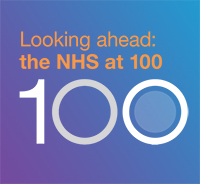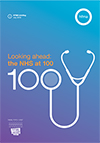Comment / Embracing future technology
 To mark the 70th birthday of the NHS, the HFMA invited a number of commentators to look ahead to what the NHS might look like in 30 years’ time, examining both the obstacles it will face and the opportunities to enhance health and healthcare. Here, Caroline Clarke discusses the impact technology is already having on the NHS and how it could transform services over the next 30 years. But there are a number of issues that finance professionals must address if they don’t want to be left behind other industries.
To mark the 70th birthday of the NHS, the HFMA invited a number of commentators to look ahead to what the NHS might look like in 30 years’ time, examining both the obstacles it will face and the opportunities to enhance health and healthcare. Here, Caroline Clarke discusses the impact technology is already having on the NHS and how it could transform services over the next 30 years. But there are a number of issues that finance professionals must address if they don’t want to be left behind other industries.
Wherever you work you will be trying to understand why there is so much variation in the care given. I truly believe that using technology in a systematic way will allow us to provide genuinely world class care that is more affordable and has better outcomes.
If you work in a hospital you will probably have encountered business cases for robotic surgery and maybe for highly automated diagnostics. You may also have come up against the massive processing power of modern central processing units (CPUs), big data and possibly the edges of artificial intelligence.
My hospital is using big data techniques, working with DeepMind, to rapidly process diagnostic results so that we can intervene earlier and more effectively in the care of patients. We are also working with our digital health record provider, Cerner, to make it much easier to standardise care pathways and provide real-time data back to clinicians so that they can make rapid adjustments to the care provided.
These applications could soon be made available in any care setting – in fact primary care has often been quicker to adopt technology. As a global digital exemplar site (that’s a future conditional phrase, but describes our ambition), we hope to roll this technology out to our clinical partners in other parts of the care system.
But it is not just NHS organisations that are using technology to improve health, individuals are too. It is likely that you may be wearing some kind of wearable technology that could contribute to your overall health. This kind of kit has been around for many years and is starting to truly change the game for whole segments of our population. People with long-term conditions can now monitor their status remotely and there are increasing numbers of health prompting motivational tools – the possibilities are endless.
I believe we won’t address the health needs of our ageing population unless we embrace these technologies. To do this there are some key issues for the finance profession to address. If we don’t we will be left lagging behind other industries and other sectors:
- reskilling the workforce – we can already see that models of providing care are changing and that the clinicians of the future will be much more reliant on technology to deliver care. Decision support software will ensure that many patients will receive much more consistent care and that our highly trained clinicians will spend more time dealing with complex patients with tricky health issues. How we reskill existing clinicians and make sure that training is flexible will be critical if we are to really reap the large-scale benefits of new technology.
- benefits case – making a compelling business case for new technology is something that we have to get better at. We need a system that allows innovation and failure to occur and that is flexible enough to let us cash out benefits in a planned way. The current system of pushing panicky tactical savings to respond to a short team cash crisis is no friend of large scale technical innovation.
- funding and commercial models – we need to get better at working strategically with digital partners over a longer period. This involves building trust on both sides and a more strategic funding model for healthcare delivery. It isn’t an argument for ever more intricate tariffs; it’s a call for higher level, long-term funding that allows providers to take risk alongside commercial partners over the technology life cycle.
- leadership – these huge changes require great clinical leadership. We need a cadre of clinicians who can see the direction that we need to go in, understand the power of technology and be prepared to have the often difficult conversations with colleagues to allow large scale change to occur. I am seeing these leaders emerge in my hospitals and it’s very exciting.
If it all goes well, in 2048, patients will be managing their own conditions more effectively from the comfort of their own homes and connecting to their primary and secondary care records automatically.
In our hospitals we will only see the very sickest patients, who will receive an unrivalled level of personalised care that is in line with the best practice available. This care will be delivered quickly and compassionately by a workforce that, rather than being frustrated by technology, will feel liberated and empowered.

Looking ahead: the NHS at 100. To mark the 70th birthday of the NHS on 5 July 2018, the HFMA has carried out some long-term thinking about the factors that will impact on the financial future of health and social care over the next 30 years, taking it through to its 100th birthday in 2048.
NHS@100 blogs
Rob Whiteman on a transforming role for finance
Sanjay Agrawal on changing the balance of responsibility
Anita Charlesworth on workforce key to meeting demographic challenge
Related content
The Institute’s annual costing conference provides the NHS with the latest developments and guidance in NHS costing.
The value masterclass shares examples of organisations and systems that have pursued a value-driven approach and the results they have achieved.